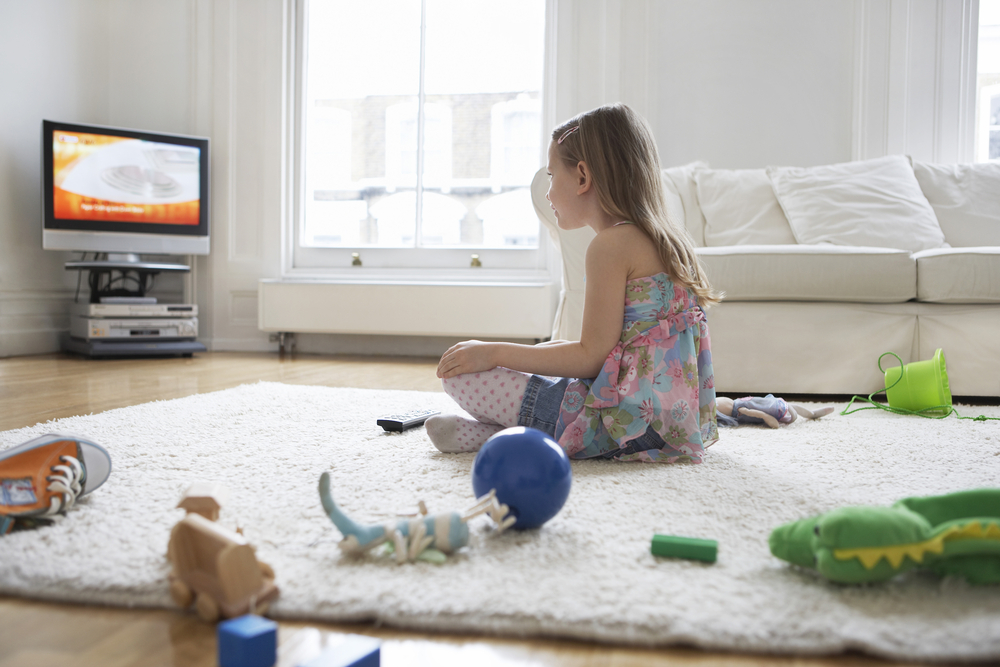The American Academy of Paediatrics recommends that children under two years old do not watch any TV, and that those over two should watch no more than two hours maximum.
Children and television often go together and although screen time can be educational, it can easily go overboard. This issue of watching TV needs to be revisited quite often as we are now surrounded by all kind of media, and we tend to forget about real communications and relationships.
The first two years of life are considered critical for normal brain development and early childhood is characterized by new social interactions, language exposure, understanding of one’s role in society, self-awareness and countless opportunities for imagination and creativity. As such, the American Academy of Paediatrics has recommended that children under two years old do not watch any TV, and that those over two should watch no more than two hours of quality shows, so that TV does not get in the way of mental, physical and social development.
A 2003 Kaiser Family Foundation survey found that sixty-eight per cent of children under the age of two watch „screen media“ every day. It also found that a baby spends about two hours a day watching a screen, more time than he reads or is being read to. This matters because sexual images and violence are large part of today’s television, just as much as infomercials and chocolate ads.
However, television can be educational as The Medical Research Council (MRC) showed in 2013. They studied more than 11, 000 school pupil and found that it is wrong to link bad behaviour with television viewing. Prof Hugh Perry, chair of the MRC’s neurosciences and mental health board, told the BBC: „We are living in a world that is increasingly dominated by electronic entertainment, and parents are understandably concerned about the impact this might be having on their children’s wellbeing and mental health. This important study suggests the relationship between TV and video games and health is complex and influenced by many other social and environmental factors.“
Children and TV: Effects of excessive viewing
So what exactly are the potential effects of excessive television viewing? Here are six problems that arise with TV:
- Obesity: The more TV your child watches, the greater his or her risk is of becoming overweight. Children who regularly spend more than four hours per day watching TV are more likely to be overweight.
- Irregular sleep: Research published in April 2014 in Paediatrics showed that the more TV children watch the less they tend to sleep. For every hour of TV watched, children tend to sleep seven minutes less per night. This adds to a growing body of evidence and literature that too much screen time in childhood is at least linked to, if not the cause of, poorer health, both physical and mental.
- Behavioural problems: Television does not provide key feedbacks that children need when learning the appropriate use of language. Spending time in front of the TV also hampers the development of social skills such as understanding one’s consequences or adapting behaviour in different social contexts.
- Impaired academic performance: Elementary students who have TVs in their bedrooms tend to perform worse on tests than do those who don’t have TVs in their bedrooms.
- Violence: Too much exposure to violence through media can desensitize children to violence. Television also reinforces gender-role and racial stereotypes that children may replicate in real life.
- Less time to play: Excessive screen time leaves less time to play, explore the physical world and create in order to think outside the box and to be able to develop creative solutions and new ways to respond to challenges later in life.
5 Pieces of Practical advice for Parents
What should you do about this? Here are five pieces of practical advice that may seem like common sense, but are nevertheless still very important to remember:
- Limit the amount of TV: there should be no television in the bedroom and mealtime should be screen-free. Monitor TV programing and contents and set viewing limits.
- Watch TV with your child: so it becomes clear that what they are doing or watching matters to you. If you don’t have time to sit all together, start another activity in the same room such as ironing or cooking or writing so they know you are still there.
- Choose specific programs: select and agree on particular shows or interactive kid-friendly programs, not just what is on the television at that time and turn it off when it is finished.
- Help them be critical: try to engage them with the program, discuss it together so they can develop a critical eye and innovative thinking early.
- Extend the television’s content: go beyond what they saw on screen and bring up books and activities that may be related, may be more educational and continue the learning and exploring experience.
[divider]
Our world is still full of interesting activities for children to engage with, with little or more supervision, when family time allows. They need these moments of freedom, decompression and creativity, as it reminds them that interactions with friends and family are still meaningful in today’s society.



















